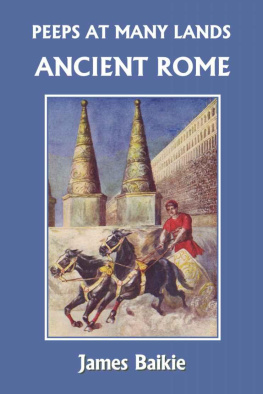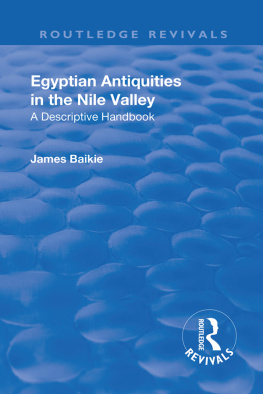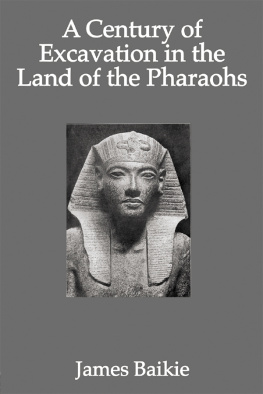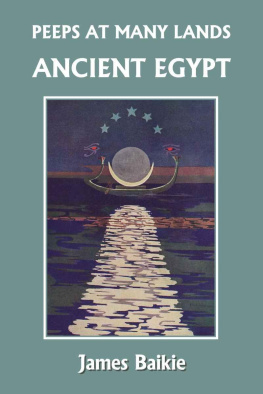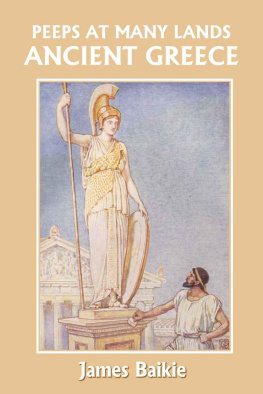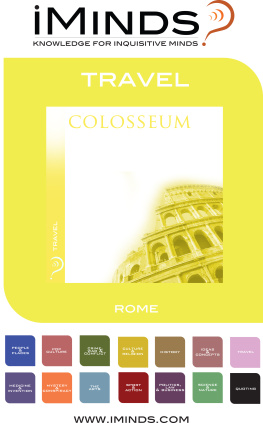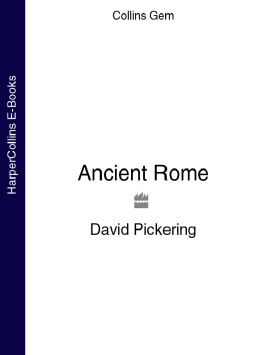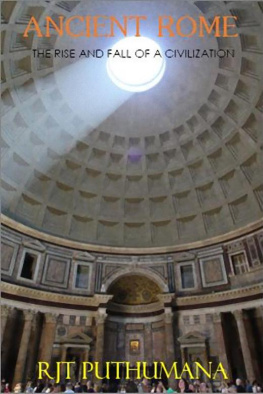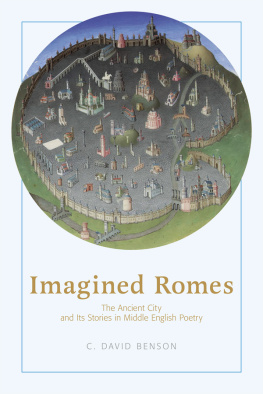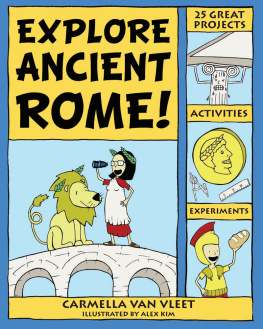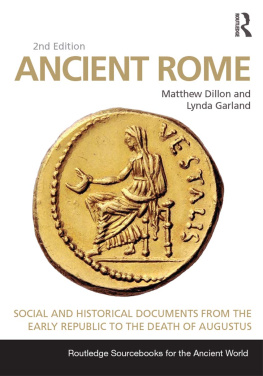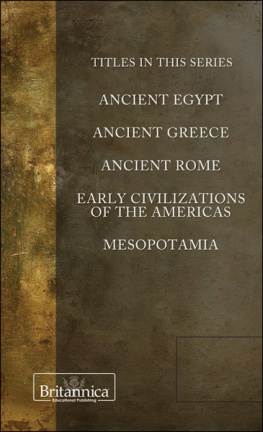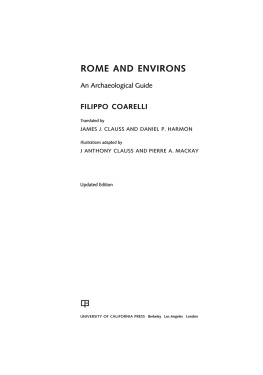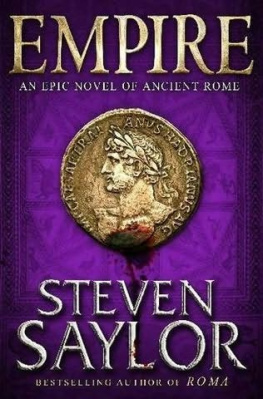Ancient Rome
by
James Baikie
Yesterday's Classics
Chapel Hill, North Carolina
Cover and Arrangement 2010 Yesterday's Classics, LLC
All rights reserved. No part of this book may be reproduced or retransmitted in any form or by any means without the written permission of the publisher.
This edition, first published in 2010 by Yesterday's Classics, an imprint of Yesterday's Classics, LLC, is an unabridged republication of the work originally published by A. & C. Black, Ltd. in 1917. This title is available in a print edition (ISBN 978-1-59915-290-5).
Yesterday's Classics, LLC
PO Box 3418
Chapel Hill, NC 27515
Yesterday's Classics
Yesterday's Classics republishes classic books for children from the golden age of children's literature, the era from 1880 to 1920. Many of our titles are offered in high-quality paperback editions, with text cast in modern easy-to-read type for today's readers. The illustrations from the original volumes are included except in those few cases where the quality of the original images is too low to make their reproduction feasible. Unless specified otherwise, color illustrations in the original volumes are rendered in black and white in our print editions.
Contents
CHAPTER I
The City of Cities
A BOUT midway down its western face, or its shin, the long boot-leg of Italy is crossed by a comparatively small but swiftly flowing river, which rises in the central mountain range of the land, the Apennines, or Abruzzi, and, after wandering among the hills awhile, flows for twenty-five miles across the plain before it reaches the Western Mediterranean, or Tyrrhene Sea, as it used to be called. The plain, with the hill slopes of the Apennines to the east and south of the river, was peopled by several races of the one stock, which went by the names of Umbrians, Sabines, Samnites, and Latins. The Umbrians, Sabines, and Samnites were mainly hill-folk, while the Latins occupied the plain between the mountains and the sea, south of the river. North of the plain and river were the cities of a race called the Etruscans, who did not belong to Italy to begin with, but had wandered into the country so far back in time that nobody knows when they came; and south of the Latin plain came the cities of Campania, which were founded by colonists from Greece, so that all this part of Italy came to be called Magna Graecia.
Thus the Latins and their neighbours, the Umbrians, Sabines, and Samnites, were hemmed in between two foreign races, and the Latins especially, dwelling in the plain, were in danger from the Etruscans, who were a restless and warlike race. One splendid natural fortress presented itself to them in the extinct volcano known as the Alban Mount, which rises to a height of about 3,000 feet in the middle of the Latin plain, a few miles south-west of the river; and the first important city of the Latins, Alba Longa, rose on this mountain-side. But soon the need was felt of having a stronghold on the river-bank to prevent the Etruscans from crossing, and a band of adventurers was sent out from Alba Longa to find a suitable place for such an outpost and to occupy it.
At a point about twenty miles by water from the river's mouth, the pioneers found a group of small hillsseven as they counted, though only three of them were of any importancerising from the riverbank to a height of about 160 feet. In the middle of the river lay a small island, which, if unoccupied, would help an enemy to cross, but, if occupied, would make crossing almost impossible. It was the best spot for their purpose that the colonists could find; and here they began to rear the rough walls and towers and houses of Alba Longa's outpost against the Etruscans. To the little fortress-town they gave, for what reason we do not know, though various stories were invented to account for it, the name of "Roma."
Little did those early Latin wanderers know how great a thing they had begun, or how vast a force they had set in motion. They thought, I suppose, that they were merely taking a prudent step to protect their native Alba Longa from the northern enemy. But ere long Alba Longa itself was eclipsed by the growing strength of the new stronghold by the riverbank, and the daughter became head of the household, while her mother sank into insignificance and finally vanished. Bit by bit the growing power of Roma asserted itself over all the other cities of the Latins, till they had become her subject-allies. Two hundred and forty years after the first stones of the little outpost were laid on the hill by the river, she had defeated the attempts of the Etruscans and of her own kindred to interfere with her government, and stood out as evidently the coming power of the land. In another two and a half centuries, in spite of one great overthrow from a barbarian host of Gauls, desperate and unceasing struggles with her own kinsfolk from the hills, and a terrible wrestle with the great Greek soldier of fortune, Pyrrhus, King of Epirus, she stood forth mistress of Italy.
Then came a great struggle, lasting for almost one hundred and twenty years, between Rome and the great commercial city, Carthage, which had been rising on the African side of the Mediterranean. That deadly contest determined whether the Empire of the world was to rest in Roman hands or in the hands of an Oriental race, for the Carthaginians were of Phoenician stock, kinsfolk to the Jews. When it ceased, with the utter destruction of Carthage, one hundred and forty-six years before the coming of Christ, Rome, though weary after her long struggle, was manifest mistress of the world as men knew it then. In another century she had carried her eagles on the east almost to the Caucasus, and on the north-west was looking across from France to our own far islands, already marked for conquest.
Her ancient form of government worn out, she took a fresh lease of life under a new one, and her early emperors carried her sway still farther out into the wilds of Europe, bringing civilization and law wherever the eagles flew. And when at last the Empire fell to pieces of its own weight and weariness, she had taught the nations not a little of the knowledge by which she herself had conquered and ruled, so that they were able to take up for themselves the work that fell from her failing hands. Even then her destiny was not accomplished. A new and still greater power, a power over the spirits of men instead of over their bodies, came to enthrone itself in the old colony of long-dead Alba Longa, and for centuries the head of the Christian faith ruled from his Roman palace over all the civilized world, with more absolute sway than Consul or Emperor ever knew. And though that sway be shrunken and diminished now, yet still one-half of Christendom looks to Rome with reverence and trust for spiritual guidance, and the great city by the Tiber still draws the hearts and the imaginations of all men to itself with the wonderful power of its great past.
Such great things have come of that little colony that Alba Longa sent forth in the dawn of history to guard the hills by the little island of the Tiber. No other city has ever had such a history. Babylon may have lasted longer, but Babylon's Empire was only a fraction of the Empire of Rome, and though we owe much to the learning of the wise men of the East, we owe more to the great law-givers and statesmen of Rome. London has a far vaster population than Rome ever knew, but London is a mushroom city compared with the grey old queen by the Tiber, and owes, besides, her birth to Rome.
There are just two towns that can rival the great imperial city in her claim to sway the hearts of men. Little towns they are, both of them, in little countries, but it may be a question whether the world has not owed more to Jerusalem and Athens than ever it has to Rome. Yet, even if it be so, the City of the Seven Hills has still its own secure place and claim upon our interest, and without its story the history of the world would be robbed of half its colour and romance. So let us glance, in the chapters of this little book, at the old stories of how the little colony of Alba Longa grew from its feeble infancy to its sturdy manhood, and at the surer histories that tell us of the heroism and steadfastness by which, once grown, it conquered the world, and try to learn a little of what life was like in Rome in the great days of old.

